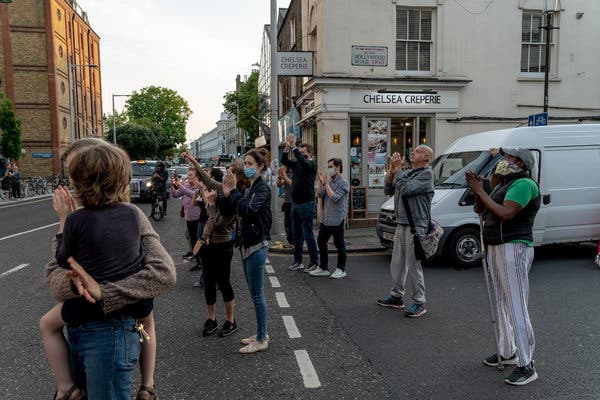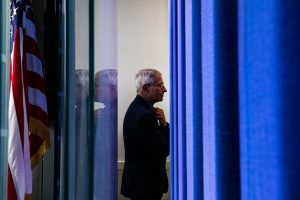LONDON — Outside her home in south London, Gill Cronin bangs a metal pot with a wooden spoon as a motorbike passes, its horn blaring. On the dot of 8 p.m., the street erupts in a noisy tribute to Britain’s health workers.
“They are amazing and have not been appreciated enough,” said Ms. Cronin, a school support worker, who offers her thanks in this way every Thursday night, and described what Britain’s National Health Service means to her in one word: “Everything.”
With its offer of free health care to all, based on need, the N.H.S. embodies qualities that Britons like to think represent the best of their nation.
Now, with the health workers risking, and sometimes losing, their lives while the government is accused of mishandling the coronavirus pandemic, the health service — which was regarded before the crisis as deeply troubled after 10 years of austerity and neglect — has become a rallying point for the nation.
Premier League soccer players have organized a fund for donations, the street artist Banksy hung artwork at a hospital in Southampton, and a 100-year-old World War II veteran, Capt. Tom Moore, raised more than 30 million pounds (about $37 million) with a charity walk.
“It is hard to explain how deeply embedded in our national psyche” the health service is, said Sarah Wollaston, a former lawmaker who chaired the House of Commons Health Select Committee. “Politicians mess with N.H.S. at their peril, because it is a national treasure.”
Even before the virus struck, the health service, though struggling, was probably still Britain’s most respected institution. As a source of national pride, it ranked first and significantly above the royal family in one 2016 survey.
At the opening ceremony of the 2012 Summer Olympics in London, the health service was featured alongside such symbols of Britishness as Queen Elizabeth II and James Bond. And it was so popular in a previous age that Nigel Lawson, a former chancellor of the Exchequer, famously described it as “the closest thing the English have to a religion.”
In normal times, such veneration tends to bemuse skeptics who associate Britain’s health service with dilapidated hospitals, overworked doctors and long waits for surgery. With an aging population and seemingly limitless demand — but extremely limited funding — the health service often struggles to cope.
When it fails, though, it tends to be politicians rather than clinicians who take the rap. So it is notable that politicians have in recent years tried to associate themselves with this national symbol wherever possible, none more so than Prime Minister Boris Johnson.
In the 2016 Brexit referendum, Mr. Johnson’s case for arguing to leave the European Union was based partly on a promise to divert the cost of Britain’s membership of the bloc (which he exaggerated) to an overstretched N.H.S.
In recent weeks, Mr. Johnson has depended on the health service in a far different way — and has talked about that, too. On being released from the hospital after being treated for Covid-19, the disease caused by the coronavirus, he thanked the health service for saving his life, offering an emotional statement in which he lavished praise on the nurses who had stood at his bedside.
A couple of weeks later, when Mr. Johnson’s newest child, Wilfred, was born, the infant’s first view of the world was — like that of most newborns in Britain — the inside of an N.H.S. hospital. He was given the middle name Nicolas after two doctors who cared for Mr. Johnson last month.
As Mr. Johnson’s government has struggled to contain the coronavirus, it has tried to harness the popularity of the health service, featuring it prominently in a slogan urging compliance with a lockdown: “Stay home. Protect the N.H.S. Save lives.”
Health service bosses attend news conferences alongside their less trusted political masters, and a smartphone app to track people infected with the coronavirus is being developed by the health service, rather than the government, to reassure people worried about privacy.
Britons have, after all, trusted in the N.H.S. since 1948, when it was created by a Labour government after World War II to forge a country that would eradicate the “five evils”: want, disease, squalor, ignorance and idleness.
Paid for through general taxation and payroll deductions, treatment is delivered to all without money changing hands, with a few exceptions such as dentistry and medication charges.
With about 1.5 million employees, the N.H.S. is the world’s fifth biggest employer by one account, after the U.S. Department of Defense, the People’s Liberation Army of China, Walmart and McDonald’s. Like several of those organizations, it has a familiar logo, in this case emblazoned on the uniform of many nurses.
“I don’t think anybody sat down in the Ministry of Health in 1948 and said, ‘What we need is a strong brand,’ but that is what we got,” said John Appleby, the director of research and chief economist at the Nuffield Trust, a health research institute in London.
“We all have respect for nurses, who are ‘angels,’ and doctors, who are ‘gods’ — that is the same as in lots of other countries,” Mr. Applebly said. “But here it is bound up with the institution they work for, and one of the differences is the existence of the N.H.S. as a brand.”
Health services in other European nations tend to be organized less centrally. They score better on some outcomes than the N.H.S., but most Britons tend to compare their system with America’s and recoil in alarm.
“If you are not able to afford care in the U.S., you are often in a dire situation,” said Ms. Wollaston, who added that despite America’s higher spending on health, “the N.H.S. delivers equity and gives better bang for your buck.”
That sense helped Britain’s health service avoid the ideological conflicts that have marred the debate over health care in the United States and escape the free market revolution of Prime Minister Margaret Thatcher in the 1980s (though, under later governments, some market-style initiatives were introduced).
In fact, the country’s health service is not the state monolith that it appears to be, but a morass of interlocking organizations, including groups of neighborhood doctors in what are mainly private businesses.
“I always say that the N.H.S. is not so much an organization as an idea,” said Stephen Dorrell, a former health secretary who added that while patients have little idea of the financial plumbing behind the scenes, they like the basic principle that “people who are ill should have access to high-quality care.”
One of the downsides of the health service’s popularity is that resources tend to be drawn to hospitals at the expense of less glamorous areas like preventive health care, Mr. Dorrell said.
Another disadvantage is that there is little incentive for clinicians to be friendly, or even particularly polite, since no money is changing hands. One joke is that the main difference in Britain for those who use private health care, as opposed to the public health service, is that a consultant will smile at them.
Yet those who have tried to change the N.H.S. have ultimately decided that it wasn’t worth the trouble. Reflecting on his time as a Conservative minister at the Health Department, Kenneth Clarke concluded that “you can declare war more peacefully than you can reform a health care system.”
Instead, governments have tended to curb its spending power. In the aftermath of the 2008 financial crisis, expenditure was squeezed during years of austerity, leaving the N.H.S. ill-prepared for the current pandemic, scrambling to expand its intensive care capacity and even to secure supplies of basic equipment like gowns and masks.
But at its moment of crisis, the one thing Britain’s health service does not lack is the support of its population.
“The N.H.S. is almost holy,” said Timothy Garton Ash, a professor of European studies at Oxford University. “It’s become the new Church of England.”
Mark Landler contributed reporting.



















